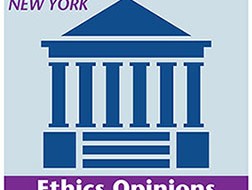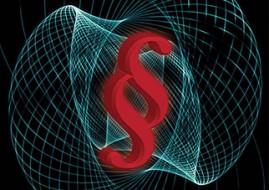State Bar Issues Opinion on Use of Internet
By Lazar Emanuel [Originally published in NYPRR December 1998]
In its first major pronouncement on law practice over the Internet, the New York State Bar Association’s Committee on Professional Ethics has issued Ethics Opinion 709 (Sept. 16, 1998). The Opinion resolves a number of crucial issues concerning use of the Internet by New York lawyers. The opinion covers many questions, including use of the Web both for advertising legal services and for disseminating advice through email. It also deals with payment of legal fees by credit card and with the use of trade names by lawyers.
The Opinion raises and resolves the following questions:
Question #1: May a lawyer make his or her services available through the Internet by obtaining requests for service tin this case, trademark services), communicating with clients through email, and rendering legal opinions?
Conclusion: The Code does not differentiate between through tax or telephone. Practice on the Internet is permissible, but subject to the following restrictions:
(i) The attorney should comply with the requirements for posting the Statement of Client’s Rights and Responsibilities by including the full text of the Statement on the website.
(ii) The attorney should diligently maintain a system from recording prior engagements and for insuring against conflicts in engagement. However, a conflicts check is not required when the information supplied by the lawyer is of a general educational nature and is not intended as advice to a particular client.
(iii) To the extent the lawyer relies on information obtained from other websites, he should take steps to check that the information is accurate and reliable.
Question #2: How must the attorney discharge the fiduciary responsibility to the client and preserve the client’s confidences and secrets when using email for lawyer-client communication?
Conclusion:
(i) The lawyer must “exercise reasonable care” to prevent others in the firm from disclosing a client’s confidences or secrets. The lawyer “should endeavor to act in a manner which preserves the evidentiary privilege… (and) avoid professional discussions in the presence of persons to whom the privilege does not extend.”
(ii) The use of email for lawyer-client communications is not inconsistent with the lawyer’s duty to maintain client confidentiality — both Congress and the state legislature have adopted statutes designed to criminalize interception of email, but that does not dispose of the issues facing the — lawyer except to discourage interference or misuse of email information. The Committee believes that there is no greater risk of email interception than of interception of telephone or fax messages. In ordinary circumstances, lawyers may use unencrypted email to transmit confidential information without breaching their duties to their clients under Canon 4, at least as the technology is in use today.
(iii) Because Internet and email technology is constantly evolving, the lawyer must stay abreast of that technology to guard against increased risk of interception, as well as to find improved ways to use technology to avoid interference.
(iv) The lawyer should discuss with the client the risks inherent in use of email for communication and should abide by the client’s wishes on how and when to use it.
Question #3: May a lawyer accept payment for services by credit card (generally, as well as over the Internet)?
Conclusion: Nothing in the Code prevents a lawyer from accepting payment by credit card, provided the usual constraints controlling fees under the Code are observed. However, in the case of credit-card payments over the Internet, the lawyer must assure that the privacy of the client’s credit card information is preserved.
Question #4: What are the standards for advertising on the Internet?
Conclusion: Basically, advertising on the Internet is not ethically different from advertising in any other form or medium. Accordingly, advertising via the Internet “…is permissible as long as the advertising is not false, deceptive or misleading, and otherwise adheres to the requirements set forth in the Code.”
(i) Internet website advertising is more analagous to a radio or TV broadcast (because the lawyer cannot identify the audience), than to a mass mailing in the lawyer’s control. For this reason, a lawyer must keep a copy of any Internet advertising for a period of not less than one full year after its use, but need not file a copy with a departmental disciplinary committee. The lawyer’s copy may be kept in electronic form.
(ii) The lawyer may ethically advertise to solicit clients who reside outside New York with respect to matters as to which the lawyer may competently and lawfully practice, but he or she must inform the potential client of the jurisdictions in which he or she is licensed. Above all, the attorney must not mislead the potential client into believing that the attorney is licensed in a jurisdiction in which the attorney is not licensed.
Question #5: May a New York lawyer render legal services or opinions over the Internet to clients who reside outside New York?
Conclusion:
(i) DR 3-101(B) instructs a New York lawyer not to practice law “in a jurisdiction where to do so would be in violation of regulations of the profession in that jurisdiction.” Therefore, whether a New York lawyer is practicing law in another state by giving an opinion on the Internet to a resident of that other state will depend entirely on the construction which the disciplinary authorities in that state give to their rules. The question is therefore beyond the scope of the Committee’s Opinion, but it is clear that lawyers in one state may “appropriately render legal services to clients resident elsewhere in many circumstances.” [N. Y. State 375 (1975).] A 1998 California case found that a New York firm that performed legal services in California without engaging local California counsel had engaged in the unauthorized practice of law as defined by California statutes. [Birbrower, et al. v. Superior Court of Santa Clara County, 70 Cal. Rptr. 2d 304 (Cal. 1998), but that decision has been criticized.]
Question #6: May an attorney conduct his law practice under a trade name:
Conclusion:
(i) The Code prohibits operation of a law practice under a trade name. [DR 2-102(B).] Such trade names as “The People’s Law Firm” and “People’s Legal Clinic, Inc.” have been found to violate this prohibition. Use of a trade name is likely to confuse and mislead the public, which may assume incorrectly that the law firm and the trade-name company are separate entities.
(ii) A lawyer may conduct under a trade name a business which is not related to the practice of law. The lawyer must recognize, however, that some businesses which can be carried on by non-lawyers (e.g., accounting services; divorce mediation services) may become the practice of law when conducted by lawyers.
(iii) A lawyer is free to conduct a business under a trade name if it is not related to the practice of law, is not used as a means of soliciting legal work in violation of a rule or statute, and does not encourage the purchase of its services by clients of the lawyer. In addition, the lawyer must not hold himself or herself out as an attorney in connection with the separate business and must not violate any other legal or ethical rule.
(iv) The lawyer must carefully scrutinize the services he or she performs in conducting a separate business under a trade name to make certain that “the services do not involve the exercise of (the) attorney’s professional judgment, which would constitute the practice of law.”
(v) The Opinion quotes N.Y. State 636, dealing with “The Will Store,” a business which sold will forms to the public. If a will form was tailored to the needs of a client, the lawyer was exercising professional judgment and was practicing law. Further, if in selling will forms to the public, an employee of the firm provided “assistance or advice in selecting the appropriate form or forms or in adapting their language to particular circumstances,” that was also the practice of law.
Lazar Emanuel is the Publisher of NYPRR.
DISCLAIMER: This article provides general coverage of its subject area and is presented to the reader for informational purposes only with the understanding that the laws governing legal ethics and professional responsibility are always changing. The information in this article is not a substitute for legal advice and may not be suitable in a particular situation. Consult your attorney for legal advice. New York Legal Ethics Reporter provides this article with the understanding that neither New York Legal Ethics Reporter LLC, nor Frankfurt Kurnit Klein & Selz, nor Hofstra University, nor their representatives, nor any of the authors are engaged herein in rendering legal advice. New York Legal Ethics Reporter LLC, Frankfurt Kurnit Klein & Selz, Hofstra University, their representatives, and the authors shall not be liable for any damages resulting from any error, inaccuracy, or omission.
Related Posts
« Out-of-State Law Practice & Escrow Accounts: Ethics Opinions May Tax-Reduction Company Retain Lawyer for Property Owner »













